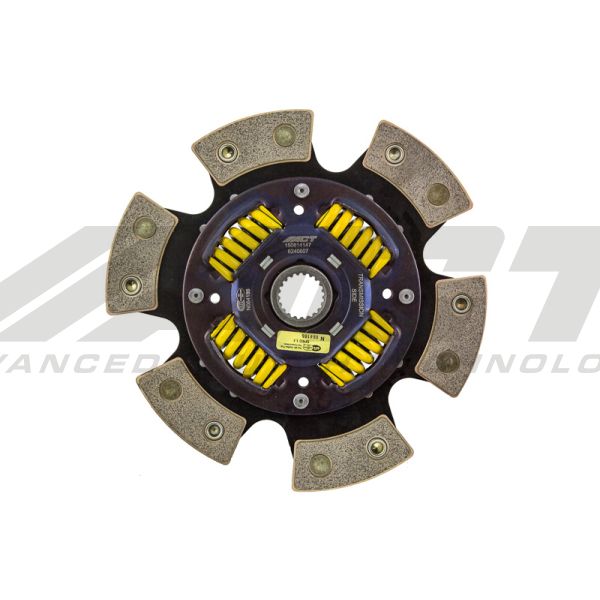We're Open! Check Our Latest Updates Regarding Covid-19 and Other Store Notices Here
6240607 - ACT 6 Pad Sprung Race Clutch Disc
was
$272.00
Special Price
$231.20
SKU
6240607
Specifications
| Item Description | ACT 6 Pad Sprung Race Clutch Disc |
|---|---|
| Product Weight (lbs.) | 4.8 |
| Disc Material | Ceramic |
| Diameter (Inches) | 9.4 |
| Diameter (Millimeters) | 240 |
| Warranty | 12 Months (view details) |
| SFI | 1.1 |
Description
6240607 is a 6-pad spring-centered race discs made with high quality ceramic friction materials. The engagement is harsher, but shifting is faster. The heavy duty torsional dampening springs are stronger, in most cases, than standard springs and are provided in the best sizes and spring rates to suit the application. The 6-pad, spring-centered disc is recommended for larger clutch sizes to absorb more heat and for smoother engagement.
| Feel | Aggressive engagement, quick shifts, mild to moderate gear rattle |
|---|---|
| Life | Premium ceramic friction materials provide moderate wear rates and high heat tolerance |
| Quality | Utilizes wraparound spring windows, thicker retainer stampings and a heat-treated, spring steel drive plate to provide support, reduce stress concentrations and increase strength and reliability |
| Recommended Use | Recommended for high horsepower street or race use |
| ACT Difference | High burst strength and holds 28% more torque than typical organic materials |
Vehicle Fitment
| Application | Engine |
|---|---|
| 1986 Toyota Supra Base | 3.0 L6 GAS FI 2954cc | DOHC | Turbocharged |
| 1987 Toyota Supra Turbo | 3.0 L6 GAS FI 2954cc | DOHC | Turbocharged |
| 1988 Toyota Supra Turbo | 3.0 L6 GAS FI 2954cc | DOHC | Turbocharged |
| 1989 Toyota Supra Turbo | 3.0 L6 GAS FI 2954cc | DOHC | Turbocharged |
| 1990 Toyota Supra Turbo | 3.0 L6 GAS FI 2954cc | DOHC | Turbocharged |
| 1991 Toyota Supra Base | 3.0 L6 GAS FI 2954cc | DOHC | Turbocharged |
| 1991 Toyota Supra Turbo | 3.0 L6 GAS FI 2954cc | DOHC | Turbocharged |
| 1992 Toyota Supra Turbo | 3.0 L6 GAS FI 2954cc | DOHC | Turbocharged |
| 1991 Toyota Soarer GT [JDM] | 2.5L I6 FI| T |
| 1992 Toyota Soarer GT [JDM] | 2.5L I6 FI| T |
| 1993 Toyota Soarer GT [JDM] | 2.5L I6 FI| T |
| 1994 Toyota Soarer GT [JDM] | 2.5L I6 FI| T |
| 1995 Toyota Soarer GT [JDM] | 2.5L I6 FI| T |
| 1996 Toyota Soarer GT [JDM] | 2.5L I6 FI| T |
| 1986 Toyota Supra 2.5 GT Twin Turbo [JDM] | 2.5L I6 FI| T |
| 1987 Toyota Supra 2.5 GT Twin Turbo [JDM] | 2.5L I6 FI| T |
| 1988 Toyota Supra 2.5 GT Twin Turbo [JDM] | 2.5L I6 FI| T |
| 1989 Toyota Supra 2.5 GT Twin Turbo [JDM] | 2.5L I6 FI| T |
| 1990 Toyota Supra 2.5 GT Twin Turbo [JDM] | 2.5L I6 FI| T |
| 1991 Toyota Supra 2.5 GT Twin Turbo [JDM] | 2.5L I6 FI| T |
| 1992 Toyota Supra 2.5 GT Twin Turbo [JDM] | 2.5L I6 FI| T |
Frequently Asked Questions
- Can an ACT Race puck-style disc be used for daily driving, and is it recommended?
- ACT's race discs are very aggressive and provide no-nonsense performance response. As a result, the engagement is harsh. Taking off from a stop can cause judder and/or an uncomfortable noise. These characteristics have no effect on the performance on the clutch or the drive line components. This type of disc should only be used in a professional race setting and never on the street. ACT always recommends using an organic disc on the street because it offers a smoother engagement and a longer lasting performance value for everyday drivers.
- When should a clutch disc be replaced?
- The majority of new discs measure .312-.315” (7.93 – 8.00mm) thick – fully worn is .275” (7.00mm) or below. A few applications (mostly Audi and BMW) start out at .332 - .335” (8.43 – 8.50mm). These are to be replaced when below .295” (7.50mm). It’s best to measure with a micrometer. Puck discs are measured as-is, where organic street discs are correctly measured by fully compressing the engagement cushion (marcel) between the linings. If the lining rivets on either side of the disc have made contact with the flywheel or pressure plate face, the disc must be replaced. Note: Using a disc that is thicker or thinner than the working range the pressure plate is designed for will have varying, and often very poor, results.
PROP 65 WARNING
This product can expose you to chemicals including carbon black, glass wool fibers, and silica (in clutch discs), chromium and nickel, which are known to the State of California to cause cancer or birth defects or other reproductive harm. for more information, visit www.P65Warnings.ca.gov


